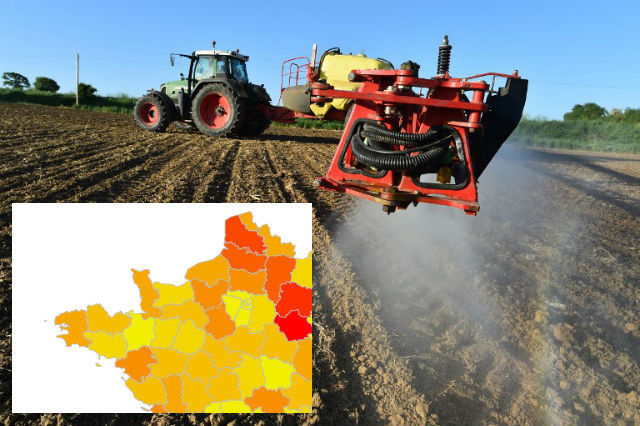Generations Futures decided to produce the map because they were inundated with questions from their own members about the use of pesticides in their area.
The association based the map on the sales of the main pesticides in each department in 2017.
And top the of the table came the department of Aube in eastern central France where over 3, 276 tonnes of the substances were sold.
In second place came Gironde in south western France where 3,154 tonnes of pesticides were sold in 2017.
In third place was the department of Marne, which is just north of Aube in eastern France.
In 4th place was Vaucluse in the south of France while Pas-de-Calais in the far north was placed 5th.
Making up the rest of the top 10 were the departments of Gard and Herault in the south, and Aisne and Somme in the north. Loire Atlantique took tenth spot. (CLICK HERE for an interactive version of the map)

The map however doesn't tell the full story as it doesn't compare the amount of pesticides bought with the amount of land used for farming.
Generation Futures produced another map that reveals the intensity with which the pesticides are used on the farmland.
In this instance the southern department of Vaucluse was top of the table for pesticide use per amount of farmland with the Gard in second place and Gironde third.

And the association also focused on the use of the controversial pesticide glyphosate which is believed to cause cancer.
Top of the so-called Glyph' Awards which ranked the departments in mainland France that were “most dependent” on glyphosate was once again the Vaucluse, followed by Gironde and the Aube.
The subject of the use of glyphosate has been controversial in France in recent months.
President Emmanuel Macron had promised that Paris would ban the widely used but controversial pesticide within three years after the EU renewed its licence last November.
But in the end, the government has left it to industry bodies to self-regulate and phase out the chemical, produced by US agro-industrial giant Monsanto, by 2021.
Macron was accused of ceding to the pressure of farm lobbies.
The weedkiller, introduced in the 1970s by Monsanto under the brand name Roundup, is suspected by some scientists of causing cancer, with a 2015 WHO study determining it was “probably carcinogenic”.



 Please whitelist us to continue reading.
Please whitelist us to continue reading.
Member comments